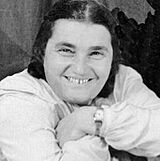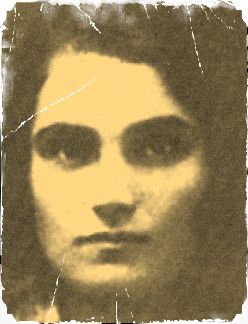Yevgenia Ginzburg facts for kids
Quick facts for kids
Yevgenia Ginzburg
|
|
|---|---|
 |
|
| Born | December 20, 1904 Moscow, Russian Empire |
| Died | May 25, 1977 (aged 72) Moscow, Soviet Union |
| Alma mater | Kazan State University |
Yevgenia Solomonovna Ginzburg (born December 20, 1904 – died May 25, 1977) was a writer from the Soviet Union. She spent 18 years in a very harsh prison camp system called the Kolyma Gulag. Her first name, Yevgenia, is sometimes spelled Eugenia. She is known for writing about her experiences during this difficult time.
Contents
Early Life and Education
Yevgenia Ginzburg was born in Moscow, Russia. Her father, Solomon Natanovich Ginzburg, was a Jewish pharmacist. Her mother was Revekka Markovna Ginzburg. In 1909, her family moved to a city called Kazan.
In 1920, Yevgenia started studying social sciences at Kazan State University. She later changed her studies to pedagogy, which is about teaching. She worked as a teacher at a "workers' faculty" (called rabfak), which helped adults get an education. By 1934, she became a docent, similar to a university professor. She taught the history of the Communist Party of the Soviet Union.
Yevgenia had two sons. Her first son, Alexei Fedorov, was born in 1926. He sadly died in 1941 during a difficult time called the siege of Leningrad. Around 1930, she married Pavel Aksyonov. He was the mayor of Kazan and an important member of the USSR government. Their son, Vasily Aksyonov, born in 1932, later became a famous writer. Yevgenia continued her work as a teacher, journalist, and administrator.
Unjust Arrest and Imprisonment
In 1934, a political leader named Sergei Mironovich Kirov was killed. After this, many people, including Yevgenia, were wrongly accused of being against the government. This period was known as the Great Purge. Yevgenia was accused of being part of a "counter-revolutionary group." She worked for a newspaper called Krasnaya Tatariia.
She was removed from the Communist Party in February 1937. A week later, on February 15, 1937, she was arrested. She was accused of working against the government and hiding it. Unlike many others, Yevgenia always said she was innocent. She told her questioners, "I do not acknowledge it. I have not engaged in any Trotskyist struggle with the party."
Her parents were also arrested but were released a few months later. Her husband, Pavel Aksyonov, was arrested in July. He was sentenced to 15 years in "corrective labor" camps. His belongings were also taken away.
Her Short Trial
On August 1, 1937, Yevgenia's trial took place in Moscow. Even though she kept saying she was innocent, the court sentenced her to 10 years in prison. She also lost her political rights for five years, and her personal property was taken. The court's decision was final, meaning she could not appeal it.
Yevgenia later wrote that her entire trial lasted only seven minutes. This included the questions and reading of the decision. She felt a great sense of relief when she heard the verdict. She had feared she would be sentenced to death. She wrote that she was happy to be alive, even if it meant being in prison. She believed she needed to live to see a better future.
Life in Prison and Exile
Yevgenia was held in famous prisons in Moscow, like Lefortovo and Butyrka. She then traveled across the Soviet Union by prison train to Vladivostok. From there, she was put on a ship called Jurma to Magadan.
In Magadan, she worked in a camp hospital. Soon, she was sent to the very harsh camps in the Kolyma valley. Here, she had to do hard "common jobs" and became very weak and sick. A doctor named Anton Walter, who was also a prisoner, likely saved her life. He helped her get a nursing job in Taskan. They later married. Anton had been sent to the camps because he was of German background.
In February 1949, Yevgenia was released from the Gulag system. However, she was ordered to stay in Magadan for five more years. She found work at a kindergarten and secretly began writing her memoirs. In October 1949, she was arrested again and sent to a different region. But at her request, she was sent back to Kolyma. No reason was ever given for this second arrest. After her status changed from prisoner to exile, she could marry Anton Walter. They adopted an orphan girl named Antonina, who later became an actress.
Freedom and Her Famous Book
After Joseph Stalin died in 1953, Yevgenia kept asking for her case to be reviewed. She was finally released from exile on June 25, 1955. She was allowed to return to Moscow and was officially cleared of all charges in 1955. This process is called rehabilitation.
She returned to Moscow and worked as a reporter. She continued writing her most important work, her memoir titled Journey into the Whirlwind. She finished the book in 1967. However, she could not publish it in the Soviet Union. The book was secretly taken out of the country and published in 1967 in Italy and Germany. It has since been translated into many languages. Her memoir is divided into two parts, which in Russian are called "Harsh Route" or "Steep Route." Yevgenia Ginzburg died in Moscow at the age of 72.
Film About Her Life
A movie about Yevgenia Ginzburg, called Within the Whirlwind, was made in 2008 by director Marleen Gorris. The actress Emily Watson played Yevgenia Ginzburg in the film. It was released in 2010.
Books by Yevgenia Ginzburg
- 1967 Journey into the Whirlwind. Harvest/HBJ Book. ISBN: 0-15-602751-8.
- 1982 Within the Whirlwind. Harvest/HBJ Book. ISBN: 0-15-697649-8.
Images for kids
See also
 In Spanish: Eugenia Ginzburg para niños
In Spanish: Eugenia Ginzburg para niños
- Samizdat
- Article 58 (RSFSR Penal Code)
- Aleksandr Solzhenitsyn
- Khrushchev Thaw
 | Georgia Louise Harris Brown |
 | Julian Abele |
 | Norma Merrick Sklarek |
 | William Sidney Pittman |



